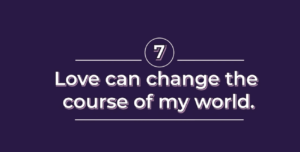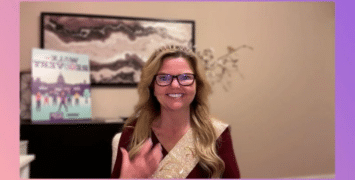Your cart is currently empty!

Monday Thoughts 2.7.22

“Loving yourself isn’t vanity. It’s sanity.” Katrina Mayer
“This life is mine alone. So, I have stopped asking people for directions to places they’ve never been.” Glennon Doyle
“Owning our story and loving ourselves through that process is the bravest thing that we’ll ever do.” Brené Brown
#7 Love can change the course of my world.
Caring is all-important.
Sobriety and recovery are acts of love that we give ourselves each day. In the past, I could not have imagined that not doing something would be considered an act of love, yet putting action behind Statement #7 does exactly that. Love changes the course of my world minute by minute, day by day.
In our WFS Program booklet, it states, “Practice of Statement #7 leads to understanding love and the importance of self-care.” For many women, self-care had been considered selfish and can feel foreign. Embracing a sober New Life is an act of self-care and opens a portal to self-love. You need and deserve your love!
How can we begin to love ourselves? Taking small mindful steps forward like the ones listed below can create healthy habits. What else can you add to change the course of your world?
- Instill trust in yourself: You are your best advocate and know what your needs are. Give yourself your trust. List your actions/decisions/choices that changed your life positively, no matter how small. Release doubt.
- Embrace your value: Your value is not contained in your looks, possessions, achievements, etc. You have value because you are YOU!
- Let go of comparison: Comparing yourself to anyone else cannot be fair, ever. It only serves to elevate/diminish. Instead, highlight your journey. No one else can ever live your life!
- Bring in boundaries: If someone will not take responsibility for their actions, a firm healthy boundary is an act of courageous self-love. You are deserving of respect, you are deserving of love.
Hugzzz
Karen
Dear 4C Women,
The 4 ways to learn to love yourself are spot on and I am thankful to Karen for sharing them.
1. We talk about rebuilding trust so others will have faith and confidence in our commitment to abstinence and personal growth. How true that learning to trust our instincts and our decisions in recovery is of utmost importance as well. It was initially one of the most difficult changes for me to make. Yet, it is absolutely possible and necessary for moving forward, for building self-esteem. Listing our positive actions reminds me of sharing positives in our meeting. It can be challenging even for those who have been attending meetings for a long time. I used to joke that if we were asked to share negatives, it would be much easier. What stood out for me in this 1st guidance tip was the key phrase, to “release doubt;” that love, loving ourselves especially, can release the doubt of feeling unworthy, unlovable, and all those “uns” that we cling to when working on developing love and self-care.
2. What do you value about yourself? It took a while for me to acknowledge and answer this question. I learned to value my loyalty, my empathy, and compassion for others. It seemed strange at first not to list my accomplishments no matter how small as that was how I defined myself. Through WFS, I was able to uncover and share my values. It was the inside work I feared to face as I lacked the self-confidence to believe I had anything to offer other than what I did. So grateful to learn the truth of my authentic value and feel comfortable about expressing it.
3. Jean spoke often about not comparing ourselves to others. You either feel superior, which removes compassion, or you feel less than and that negates supporting your recovery and well-being. I sometimes felt triggered by the success of others, whether material possessions or achievements. I judged myself by a standard that was unrealistic or damaging. Which goes back to tip #2 in learning to value ourselves, the inside feeling work we do. That cannot be taken away and is immeasurable.
4. Oh, boundaries! This might be the biggest challenge of all and still is at times when it comes to family. There’s so much emotional history attached to creating those boundaries. In the beginning I felt guilt and shame for a long time and didn’t think I could set boundaries as I was so intent on appeasing/pleasing everyone, never saying no and remained a shell of the 4C woman I wanted to be. On the outside, I appeared differently than I felt inside. Once I slowly began setting boundaries, I felt such a sense of freedom and self-love. I found and spoke my voice with that compassion I felt inside but was afraid to be seen as weak to express. Goodbye toxic people, condescending people, feeling invisible and undeserving of respect. I came across this quote: Accept people where they are, but place them where they belong. You are the CEO of your life. Hire, fire and promote accordingly. A good quote for setting boundaries.
Many times, we discuss the negative baggage we bring into the present. I believe that practicing Statement #7 is one of those statements that begins the unpacking of old messages that no longer speaks our present truth or serves our recovery journey. It teaches us to reclaim our power, our self-worth, our deserving of love and self-respect. Grab it, practice it, unpack the baggage and fill it with love, caring. self-respect and self-care. Dee




